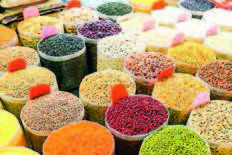Myanmar bagged more than US$485 million from over 530,000 tonnes of pulses over the past two months of the current financial year 2024-2025 beginning 1 April, the Ministry of Commerce’s statistics showed.
Myanmar’s pulse exports by sea totalled over 510,650 tonnes of pulses worth $440.6 million. In contrast, over 21,060 tonnes of pulses worth $17.97 million were sent to the neighbouring countries between 1 April and 7 June this FY.
The value of Myanmar’s pulses exports hit over US$1.484 billion from over 1.76 million tonnes in the previous FY 2023- 2024 (April-March), comprising 1.6 million tonnes worth $1.34 billion through maritime trade and 157,400 tonnes worth $141.38 through border posts, the Ministry of Commerce’s statistics indicated.
Myanmar mainly exports black grams, green grams and pigeon peas to foreign markets. Of them, black grams and pigeon peas are primarily shipped to India, while green grams are exported to China and Europe.
India has growing demand and consumption requirements for black grams and pigeon peas. According to a Memorandum of Understanding between Myanmar and India signed on 18 June 2021, India will import 250,000 tonnes of black grams and 100,000 tonnes of pigeon peas (tur) from Myanmar for five consecutive years from 2021-2022 financial year to 2025-2026 FY. This G-to-G pact will not affect the pulses’ annual quota set by India. Myanmar’s exporters are also entitled to deliver the pulses to India under that yearly quota.
Myanmar’s black gram output is estimated at 400,000 tonnes per year, whereas pigeon pea production crosses 50,000 tonnes.
The Myanmar Pulses, Beans, Maize and Sesame Seeds Merchants Association stated that black grams, which India primarily purchases, are commonly found only in Myanmar, whereas pigeon peas, green gram and chickpeas are grown in African countries and Australia. — NN/ EM


